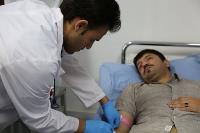 Mir Yaqoob donated blood in KabulKabul 3 July 2016 - Afghanistan is facing blood shortages during the holy month of Ramadan as fewer people are donating blood. The Ministry of Public Health, with the support of WHO, is organizing blood collection drives in Kabul to ensure sufficient blood supplies in the country’s hospitals.
Mir Yaqoob donated blood in KabulKabul 3 July 2016 - Afghanistan is facing blood shortages during the holy month of Ramadan as fewer people are donating blood. The Ministry of Public Health, with the support of WHO, is organizing blood collection drives in Kabul to ensure sufficient blood supplies in the country’s hospitals.
“Before Ramadan started, we had campaigns to collect more blood by using mobile buses. We are still facing some shortages, especially in all the negative blood types,” said Dr Safiullah Musleh from the Central Blood Bank of Afghanistan. Donating blood is safe and possible during the fasting month of Ramadan but many feel they do not have enough energy to donate.
There are currently 122 695 voluntary blood donors in Afghanistan who are regularly donating blood, 8% of whom are women. Out of all blood donors, 54% are family donors, 45% are voluntary donors and 1% are paid to donate. To meet the growing need for blood and blood products, more people must come forward to donate blood voluntarily and regularly.
“If a major emergency strikes, we often face blood shortages. For example, 2 months ago a huge truck bomb exploded in Kabul, killing 64 people and injuring over 300 others. We face these violent incidents and explosions often so hospitals need to be prepared with adequate blood supplies,” said Dr Musleh.
“The majority of the donated blood goes to trauma cases resulting from different disasters, C-sections, surgeries, women with pregnancy complications during or after childbirth and children with severe anaemia,” said Dr Mohammad Faisal, Executive Assistant at the Afghanistan National Blood Safety and Transfusion Services.
WHO recently distributed equipment to bloods banks in 21 provinces to enable them to gather, test, store and preserve blood and operate effectively. WHO supports safe blood donation in Afghanistan through training health care providers on blood transfusion and blood bank management, supporting the blood transfusion service surveillance system and developing national guidelines and standards for blood transfusion.
“We need more blood donors to save Afghan lives. Donating blood takes only a few minutes and it is completely safe,” said Dr Richard Peeperkorn, WHO Country Representative. “Blood can be stored for only a limited time before use so we have a constant need for regular blood supply. We encourage everyone to donate blood freely and often to ensure that safe blood will be available whenever and wherever it is needed.”
The amount of blood donated in Afghanistan over the past decade has increased by over 100%; however, more voluntary donors are needed to meet the growing demand for blood transfusion. People can donate blood in all district, provincial and regional hospitals around Afghanistan and in mobile blood collection sites regularly set up by the Ministry of Public Health around the country.
“I donate blood because I want to save lives and help others,” said Mr Yaqoob Mir as he was donating blood in Kabul. “I do this especially for the children. My neighbour’s child has thalassemia which is a congenital blood disorder. I want to help him and other boys and girls who suffer from illnesses and need blood.”


